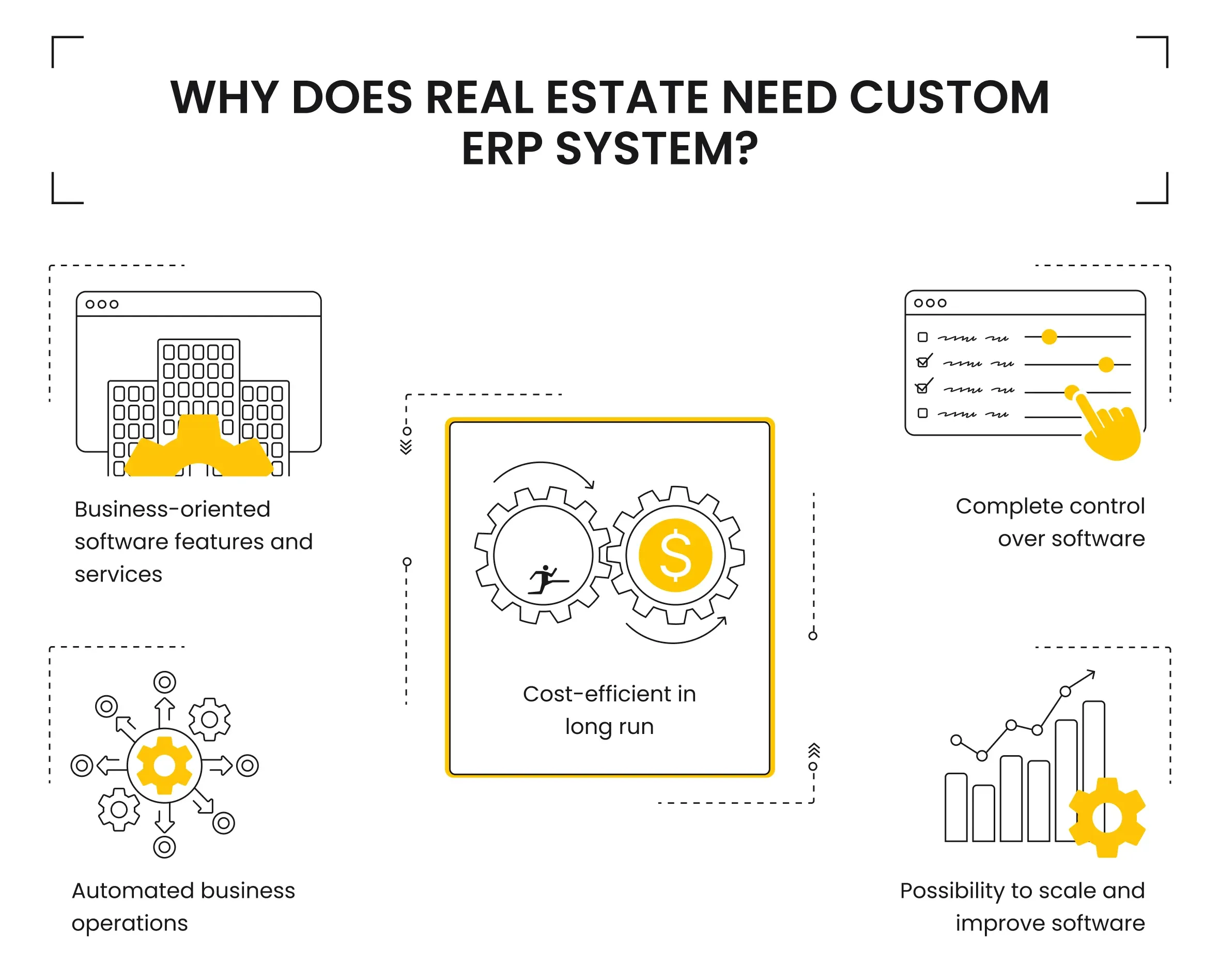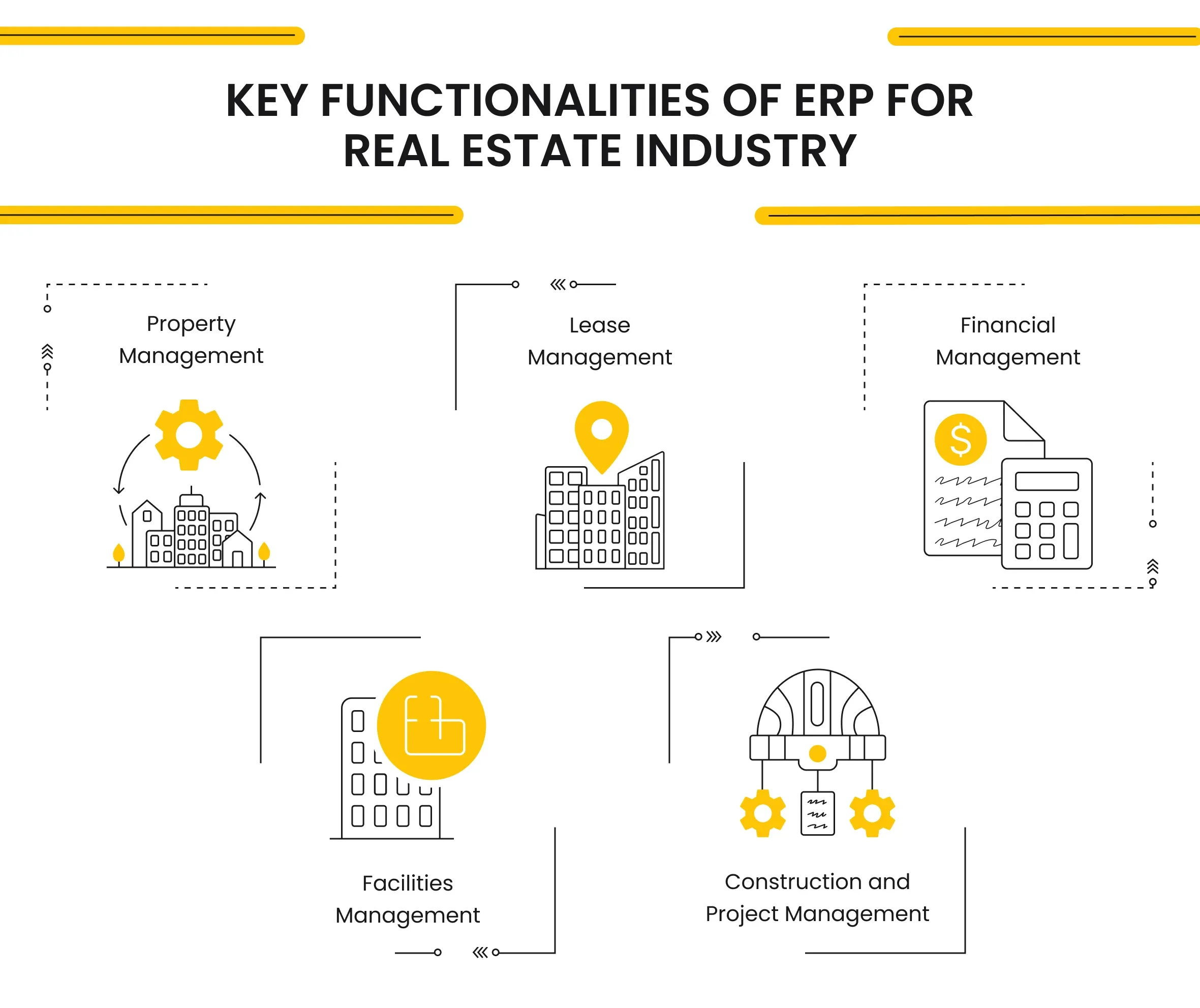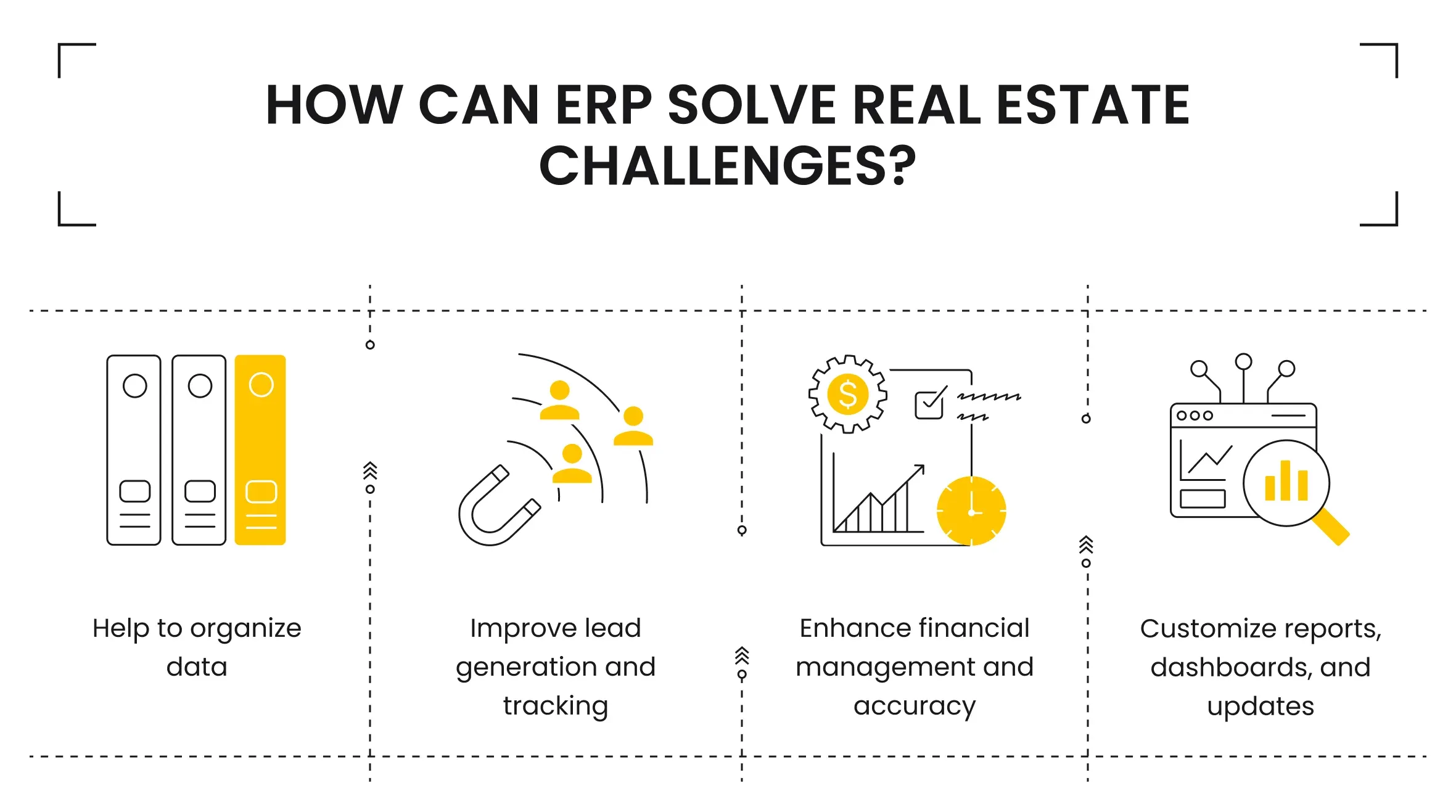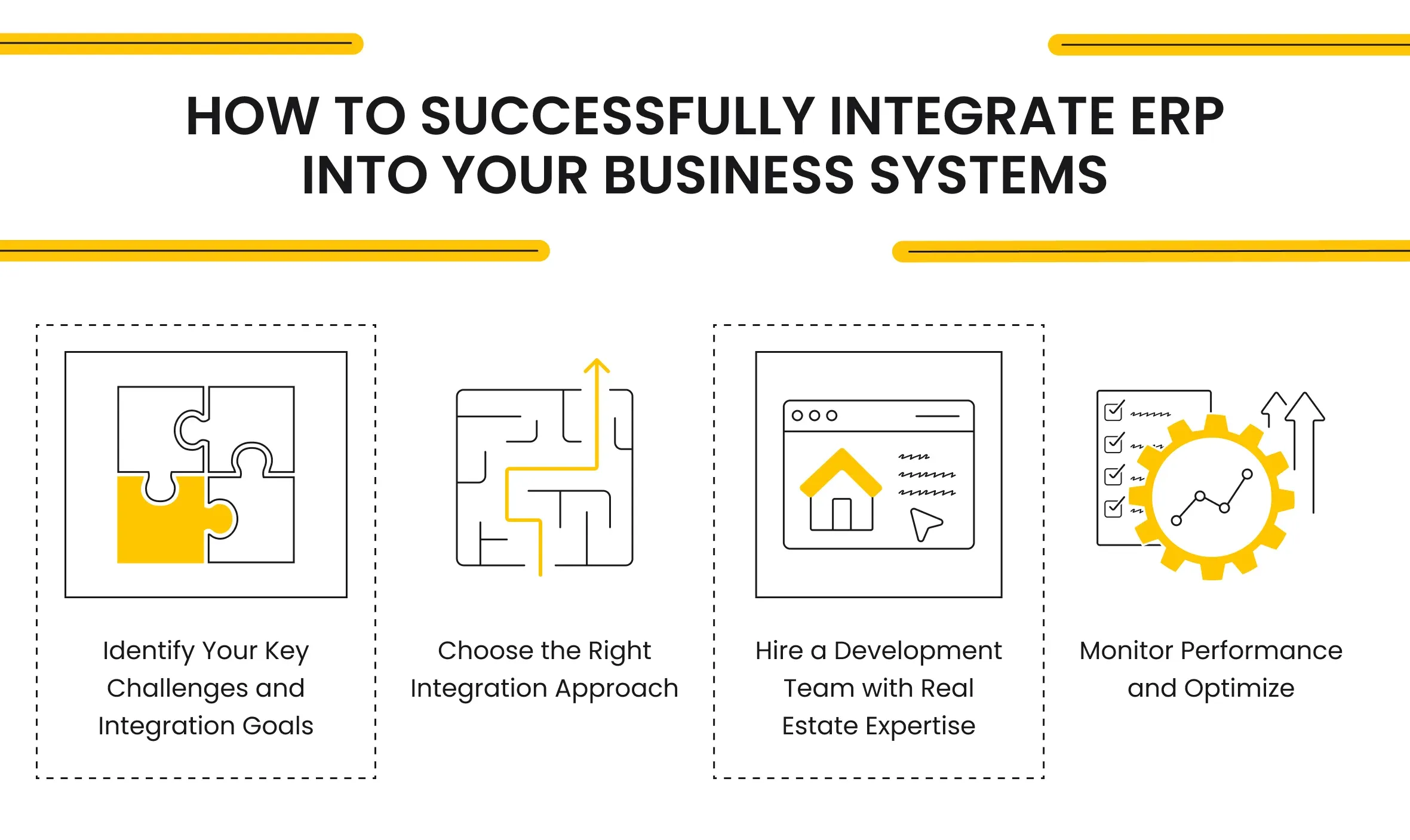Real Estate
Integrating a Real Estate ERP with Other Business Systems: A How-To Guide
March 28, 2025 • 144 Views • 21 min read
Bohdan Vasylkiv
CEO & Co-Founder
Modern software development consulting services suggest countless solutions for all types of businesses. Starting with centralized data storage, analysis, and processing, and ending with automation of business operations.
One of the core benefits of software for PropTech companies is the possibility to integrate a real estate ERP (Enterprise Resource Planning) system that can cover end-to-end business processes.
Such software integration has its pros and cons, which are worth considering. Nevertheless, denying the advantages of such systems on board is challenging.
Why Does Real Estate Need a Custom ERP System?

Let’s start with the basics. Enterprise resource planning systems are centralized software-based platforms designed to improve undergoing processes, streamline some operations, and increase overall business awareness.
At the moment, there are two core approaches to integrating ERP systems:
- Maintaining custom software development process from scratch when the real estate business hires a reliable technological partner responsible for end-to-end development.
- Choosing a ready-made real estate ERP distributed in terms of software-as-a-service solutions. In such cases, property businesses simply find the most suited platforms already designed and developed.
Both solutions have their benefits and challenges.
For instance, creating custom ERP for real estate industry suggests building tailored software that meets all business needs and expectations, offers all demanded features, etc. Besides, companies have complete control over the system, being able to scale functionality, integrate new features, and perform many other operations.
However, custom projects are much more demanding regarding time, resources, and technological expertise. For illustration, such an approach needs a huge initial budget for hiring niche-experienced developers, paying for software development projects, and spending money on the best development tools. Moreover, it requires time and technical skills for successful product delivery.
Still, custom development is a much more cost-efficient solution for long-term operations: after the software is delivered, all you have to pay for - is the system’s maintenance.
At the same time, SaaS real estate ERP solutions can be integrated on the spot, requiring almost no time for adaptation. Additionally, instead of a vast initial budget, such systems are subscription-based, i.e., businesses must pay monthly fees, significantly reducing expenses compared to custom projects. They also require no advanced technical expertise or software maintenance.
Nonetheless, like any other ready-made software, SaaS ERP for real estate industry offers a conventional set of features and services standard to all management solutions. Businesses with specific demands might struggle to find services that meet their expectations. Apart from that, such platforms provide all their customers equal benefits, negatively impacting your competitive advantage. Finally, as SaaS customers, business owners don’t have control over the system, i.e., they can’t implement changes or integrate new features independently.
So, why should companies choose custom real estate software development services? The short answer is that the main reasons for prioritizing custom projects over ready-made solutions are the long-term use perspective and complete control over functionality, including personalized software features planning and creation.
Key Functionalities of ERP for Real Estate Industry

Let’s also discuss these key functionalities that should always be included in an ERP for construction company. Like any other complex management system, real estate ERP is a centralized platform for many departments and business operations. The core industry-specific services for such a platform in PropTech include tools for:
- Property management
- Lease management
- Financial management
- Facilities management
- Construction and project management
Property Management
The first and most apparent real estate technology trend is the management toolset related to property management and asset tracking. It is a core functionality that drives and supports other services. Besides, it is beneficial for real estate companies to store all required information about their properties.
It includes property maintenance and data updates, storing historical data about all operations, and linking the property with tenants and real estate agents. Long story short, all the services are related to property. However, their variety differs depending on the business needs and priorities if we discuss a custom development approach.
Lease Management
Another crucial service for real estate companies is lease management. Simply put, it assumes integrating in-app payment gateways, linking tenant payments with property assets, etc.
In other words, to gather and process all lease-related data in a centralized way, with the ability to track their success, collect information for future analysis, etc. This feature is vital for companies that deal with property renting but is not required in ERP for construction or other rent-unrelated operations.
Financial Management
Financial management instruments are an acceptable alternative to lease management. They cover all financial operations that have nothing to do with property leasing. The functionality and services are similar to leasing administration, yet they are more complex and scalable because financial management covers all related processes, including expenses on property maintenance, construction, or even costs of business operations.
Facilities Management
These services are commonly confused with property management. Although they are very similar, one core difference between them is their focus areas and the aspects they cover.
To cut a long story short, property management is almost exclusively about tenant-agent interactions. It includes financial and legal administration, as well as support with ownership and tenancy processes. At the same time, facility management is about tenant-property operations. It covers all aspects related to the state of the property asset, like its convenience, safety, functionality, etc. In a nutshell, facility management is about ensuring the property meets the regulations and standards.
Construction and Project Management
Finally, if you need an ERP for a construction company, you should ensure that future systems offer tools and services for construction administration, project management, etc.
Also known as site management systems, such software-based solutions assist businesses with managing construction sites, real estate development progress, etc. In fact, these platforms are similar to traditional project management solutions with slight differences and adjustments.
How can ERP Solve Real Estate Challenges?
In addition to the functionality mentioned, real estate ERP can help address many industry-specific challenges and issues. To illustrate better, let’s discuss some core challenges software can fix.

Challenge: Disorganized Property Data
Any administrative process highly depends on data. Still, data types vary depending on the industry specifics.
The property business deals with a lot of information covering many aspects, yet one of the most essential is property data. Due to the complexity and variety of data types, managing information becomes challenging for real estate businesses. The solution for such a challenge is simple: creating a centralized property management system.
Thanks to such an approach, companies can gather, store, sort, and process all information and access it on demand. You can easily upscale such services even more by embodying additional features like data filtering and linking, choosing the best data security services, etc. Such solutions are relatively simple and can be integrated by almost any software development team.
Despite the simplicity, such systems will bring much value and efficiency to property data management, boosting business performance and creating an organized data monitoring and processing environment.
Challenge: Inefficient Lead Management
Another common challenge for businesses, regardless of industry, is poor and inefficient lead management. Sales and marketing departments highly depend on the quality of lead management and related data. Solution? Developing automated CRM and sales tracking software.
Customer Relationship Management systems were created specifically to improve the services offered. Thanks to built-in data gathering and analysis features, CRM provides businesses with information about customer experience and satisfaction.
Companies can use this info to learn more about user experience and see their feedback, reports, etc. Knowing all of this helps business owners improve their operations.
Such systems also provide sales and marketing departments with information on lead generation and gather and analyze data on the efficiency of related operations. Besides, these systems are automated, helping to save resources and time by streamlining many manual processes and allowing specialists to prioritize more complex or urgent tasks.
Challenge: Financial Mismanagement
Another aspect secured by real estate ERP systems is financial management.
Once again, property businesses can improve their financial management and ensure transparency and accuracy thanks to enhanced data practices and automation options. Integrating automated accounting and budgeting is the easiest and most efficient way to boost financial factors.
For instance, it can involve implementing an in-app payment gateway, using ready-made APIs, or creating a custom finance management system to meet specific business needs and expectations.
The variety of options is limitless and can be chosen based on the needs of your property company.
Challenge: Lack of Real-Time Insights
Finally, an enterprise resource planning system is an excellent solution for decision-making. Apart from supporting businesses with everyday tasks and achieving higher operations efficiency, ERP can offer a real-time awareness of the current situation regarding business possibilities and market changes.
Software-based customizable reports and dashboards with real-time infographics are among the must-have features of any management solution. However, custom software development offers more scalable and flexible options, like AI integration for property companies.
The possibility of using innovative technologies is a real deal-breaker for many modern companies, especially regarding AI-driven virtual assistants. Artificial intelligence shows incredible results in dealing with big data, as well as in analyzing and summarizing it.
Such tools can upscale and automate countless tasks and operations within the business. However, their core use case is gathering real-time insights into the market and industry.
Apart from identifying trends, such assistants can help to pinpoint issues or potential improvements for business.
How to Successfully Integrate ERP into Your Business Systems
Finally, let’s discuss the best way to successfully integrate real estate ERP into your property business.

Judging from our experience, similar systems require a personalized approach to meet and satisfy business needs and expectations. Thus, we won’t discuss how to choose a SaaS solution. Instead, let’s consider a custom software development project.
Any experienced technological partner will probably agree with our statement and offer similar management software solutions while considering other industry-specific projects like real estate mobile app development.
Long story short, there are only four core steps to achieve successful ERP implementation before starting this process on the code level:
- Identify Your Key Challenges and Integration Goals
- Choose the Right Integration Approach
- Hire a Development Team with Real Estate Expertise
- Monitor Performance and Optimize
Identify Your Key Challenges and Integration Goals
Just like any other new project, ERP integration demands detailed planning and identification of core goals to achieve. In other words, before you start any actions, you must understand the objectives you want to achieve or satisfy with such a system.
First of all, this helps to plan the software development process and its successful delivery: knowing your goals, objectives, and the scope of work, the development team can define each project step, making a correct estimation and road map. As a result, it:
- becomes easier for developers to correctly estimate their tasks and choose the most suitable and efficient tools for future projects.
- helps to create a more manageable working environment with more accurate deadlines and clarity of current and future assignments and load.
Secondly, identifying the key challenges and objectives can help you make a more balanced choice. For instance, less complex management systems or even different types of software can satisfy your needs. Your tech partner may even advise using a ready-made solution with certain adjustments.
Finally, knowing the challenges ahead gives you an additional advantage, suggesting potential ways to avoid mistakes or prepare for future issues. For instance, if you know the project will be complex and time-intensive, you can find ways to perform the required operations with other solutions while your real estate ERP is under development.
Choose the Right Integration Approach
Such systems are usually highly complex, so consider the best potential integration approach. This also assumes planning IT architecture and infrastructure, etc. Choosing software development consulting services during the planning phase is one of the easiest ways to ensure its success.
Simply put, this platform type requires much more planning than other software projects. While smaller software applications can be adjusted in the future, which is challenging yet not impossible, ERM redesign will require a lot of resources, time, and high-level software development expertise. Still, it won’t guarantee 100% success.
Therefore, to prevent wrong choices and start thinking in advance, we recommend covering as many factors as possible before starting the development stage itself. We highly recommend discussing all possible options with experienced specialists and engaging CTO consulting.
Although it might be expensive at first glance, it can not simply “save expenses” but the whole project in the future. So, this price is reasonable and worth consideration.
Hire a Development Team with Real Estate Expertise
After clarifying and defining as many details as possible, you can proceed to hiring a development team. Ideally, it must be a niche-experienced dedicated development team with expertise in real estate software creation.
To save your and our time, we suggest our guide on how to hire the best custom software development team if you don’t have such experience.
The best way to ensure that you made the right choice and found a reliable, dedicated team is to have them cover all project aspects independently, even without your engagement.
Monitor Performance and Optimize
Finally, if you made the right choice and hired a reliable team, you will only have to observe and monitor until the software is delivered. Dedicated developers will handle all aspects of the task.
Nevertheless, you should also participate in approving new methods, solutions, or technologies. The team will ask you to make a final decision on each crucial aspect, explaining the pros and cons of each action or decision.
Eventually, you are the client and the one, who covers the project's expenses. So, at least, you must be informed about all possible outcomes, approaches, and solutions.
What’s your impression after reading this?
Love it!
1
Valuable
1
Exciting
1
Unsatisfied
1
FAQ
Let us address your doubts and clarify key points from the article for better understanding.
What systems can be integrated with a real estate ERP?
CRM, accounting, property management, marketing, payment gateways, document management, and analytics platforms.
What are the benefits of integrating an ERP for real estate industry?
Automation, efficiency, cost savings, better data management, improved decision-making, scalability, and enhanced customer experience.
How long does it take to integrate a real estate ERP?
It varies based on complexity but typically takes a few weeks to several months.
How to choose the best integration approach for my business?
Consider business needs, system compatibility, scalability, budget, and security. Consult experts for the best approach.
INSIGHTS
Must-Have Features for Successful Real Estate Mobile App Development in 2024
Real Estate App Development vs Web Development: Which is Right for Your Business?
Let’s talk!
This site uses cookies to improve your user experience. Read our Privacy Policy
Accept
Share this article